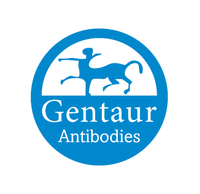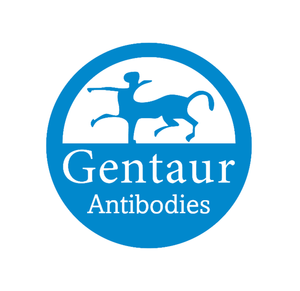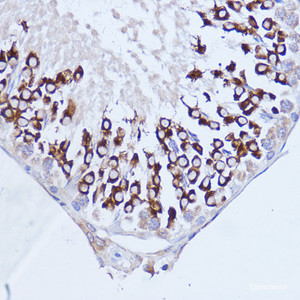ATP1B2 Polyclonal Antibody | G-AB-04801
Gentaur Antibodies
- SKU:
- G-AB-04801
- Availability:
- 3 to 5 Working Days
- Host:
- Rabbit
- Reactivity:
- Human, Mouse, Rat
ATP1B2 Polyclonal Antibody | G-AB-04801 | Gentaur Antibodies
Overview: The protein encoded by this gene belongs to the family of Na+/K+ and H+/K+ ATPases beta chain proteins, and to the subfamily of Na+/K+ -ATPases. Na+/K+ -ATPase is an integral membrane protein responsible for establishing and maintaining the electrochemical gradients of Na and K ions across the plasma membrane. These gradients are essential for osmoregulation, for sodium-coupled transport of a variety of organic and inorganic molecules, and for electrical excitability of nerve and muscle. This enzyme is composed of two subunits, a large catalytic subunit (alpha) and a smaller glycoprotein subunit (beta) .
Category Type: Polyclonal Antibody
Research Areas: Cancer, Metabolism, Signal Transduction
Synonyms: adhesion molecule on glia, AMOG, AT1B2, AT1B2, ATP1B2, ATPase Na+/K+ transporting beta 2 polypeptide, ATPB2, ATPB2S, MGC93648, Na+/K+ -ATPase beta 2 subunit, Na, K ATPase beta 2 polypeptide, RATATPB2S, sodium potassium ATPase subunit beta 2 (non-catalytic) , sodium pump subunit beta 2, sodium/potassium dependent ATPase beta 2 subunit, Sodium/potassium dependent ATPase subunit beta 2, sodium/potassium transporting ATPase beta 2 chain, sodium/potassium transporting ATPase subunit beta 2, Sodium/potassium-dependent ATPase subunit beta-2, Sodium/potassium-transporting ATPase subunit beta-2
Reactivity: Human, Mouse, Rat
Host: Rabbit
Isotype: IgG
Gene ID:
Accession #: NP001669
Clonality: Polyclonal
Immunogen: Synthetic peptide of human ATP1B2
Clone #:
Conjugation: Unconjugated
Swissprot: P14415
Santa Cruz:
Calculated MW: 33 kDa
Observed MW: Refer to figures
Concentration: 0.6 mg/mL
Buffer: PBS with 0.05% NaN3 and 40% Glycerol, pH7.4
Purification method: Antigen affinity purification
Application: WB, IHC, ELISA
Dilution: WB 1:500-1:2000, IHC 1:50-1:100, ELISA 1:5000-1:10000
Storage: Store at -20°C. Avoid freeze / thaw cycles.













